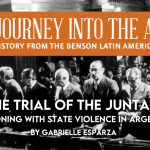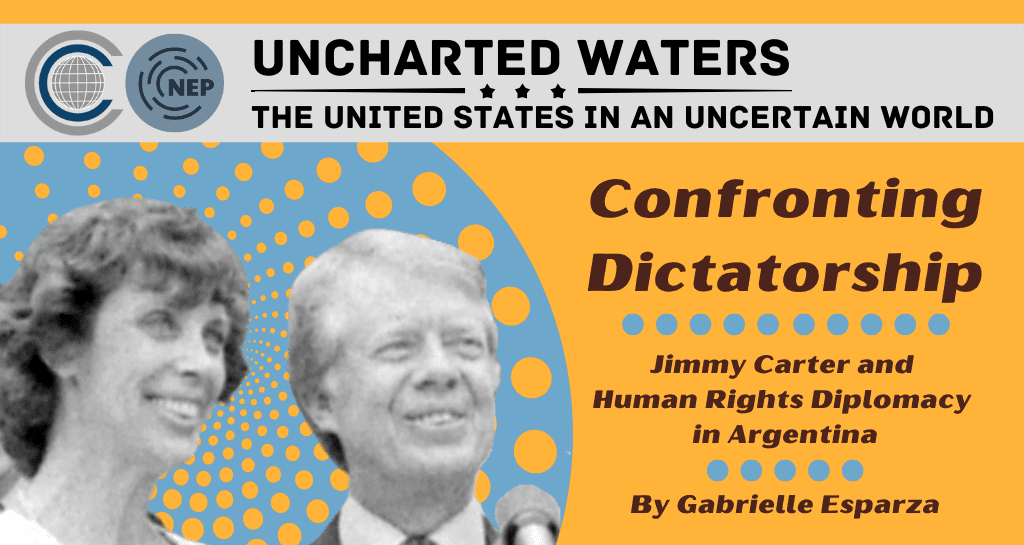
Commentators and scholars have long represented the United States as the supreme guarantor of a well-tempered international order. Today, however, agents of American international relations find themselves confronting uncertainty both at home and abroad. Nevertheless, as they navigate the uncharted waters of contemporary global politics, representatives of the United States and its international interlocutors can still look to their shared past for insight. There are lessons, some positive, some deeply negative, to be learned in the long, complex, and decidedly messy history of the United States in the world.
Produced in collaboration with the Clements Center for National Security, Not Even Past‘s “Uncharted Waters” series is bringing that history to life in detailed case studies, highlighting moments when Americans have grappled with the uncertainties of power. Our aim is to document unease and confusion, hidden dangers and unexpected opportunities. In so doing, we will provide readers with a fresh and provocative perspective on the history of American foreign relations.
U. S. President Jimmy Carter’s inauguration in January 1977 led to tensions between the United States and Argentina, which had been ruled by a military dictatorship since a coup roughly nine months earlier. The dictatorship had ushered in a period of unprecedented violence. Task forces, whose members dressed in civilian clothes, abducted suspected “subversives” and transferred them to clandestine detention centers throughout the country. In these detention centers, military officers subjected victims to interrogation, torture, and sexual abuse. Most victims died at the hands of their torturers.[1] Despite growing evidence of state-sanctioned human rights violations, the Argentine military junta had enjoyed friendly relations with the U. S. under outgoing President Gerald Ford. By contrast, President Carter reimagined U. S. foreign policy in Latin America. His State Department challenged Washington’s historical alignment with right-wing anticommunist regimes from Guatemala to Argentina. Carter and his diplomats publicly condemned the Argentine military’s violent tactics and withheld economic aid. By championing human rights diplomacy, Carter not only dramatically redefined the U. S. Cold War relationship with Argentina but also expanded the political imaginations of and the range of action available to agents of U. S. foreign policy.
Many within the U. S. government initially hoped that the 1976 military coup would help restore order to a country facing economic and political instability. At the time, mass unemployment, high inflation, and a declining standard of living helped foster the development of urban guerrilla movements. These groups used increasingly extreme tactics, such as the kidnapping and assassination of high-profile political and business figures, to destabilize President Isabel Martinez de Perón’s government. Isabel had ascended to the presidency following the death of her husband and immediate predecessor, the charismatic populist leader Juan Domingo Perón, in July 1974. Despite Isabel’s lack of political experience, Perón had selected her as vice-president to pacify competing factions of the broad and increasingly unruly Peronist coalition.
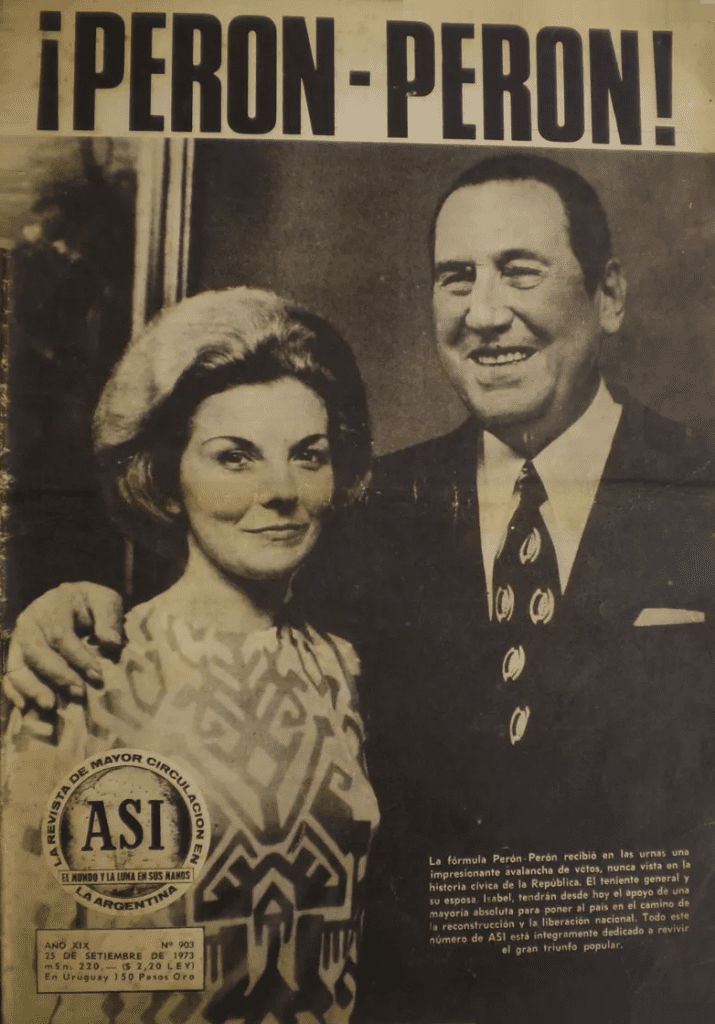
Isabel’s inexperience combined with extreme intra-party divisions led to an unmanageable situation. Throughout her short administration, political violence intensified as the militant left and right sought to gain control of the Peronist movement. The Argentine Anti-Communist Alliance, a paramilitary arm of the movement’s right-wing, became particularly active during Isabel’s presidency, leading to the assassination of more than 1,000 people including political opponents and suspected leftist guerrillas. Incapable of restraining fighting between the militant left and right, President Martinez de Perón announced a state of siege, granting the armed forces significant autonomy in counterinsurgency campaigns. Assistant Secretary of State for Inter-American Affairs Harry W. Shlaudeman described the events in Argentina as approaching “civil war dimensions.”
The bloodless coup carried out by the military junta on March 24th stood in stark contrast to the violence that had engulfed the Martinez de Perón administration. It also marked the sixth military coup since 1930. Thus, many Argentine and international political actors had come to expect regular intervention by the armed forces. “This was probably the best executed and most civilized coup in Argentine history,” U. S. Ambassador Robert Hill assured his superiors one week after the military takeover. “Argentina’s best interests, and ours, lie in the success of the moderate govt now led by Gen[eral] Videla,” whom the coup had installed as President.[2] The nonviolent seizure of power led many within the U. S. government to believe that Videla and the armed forces would quietly contain subversive forces and restore order.
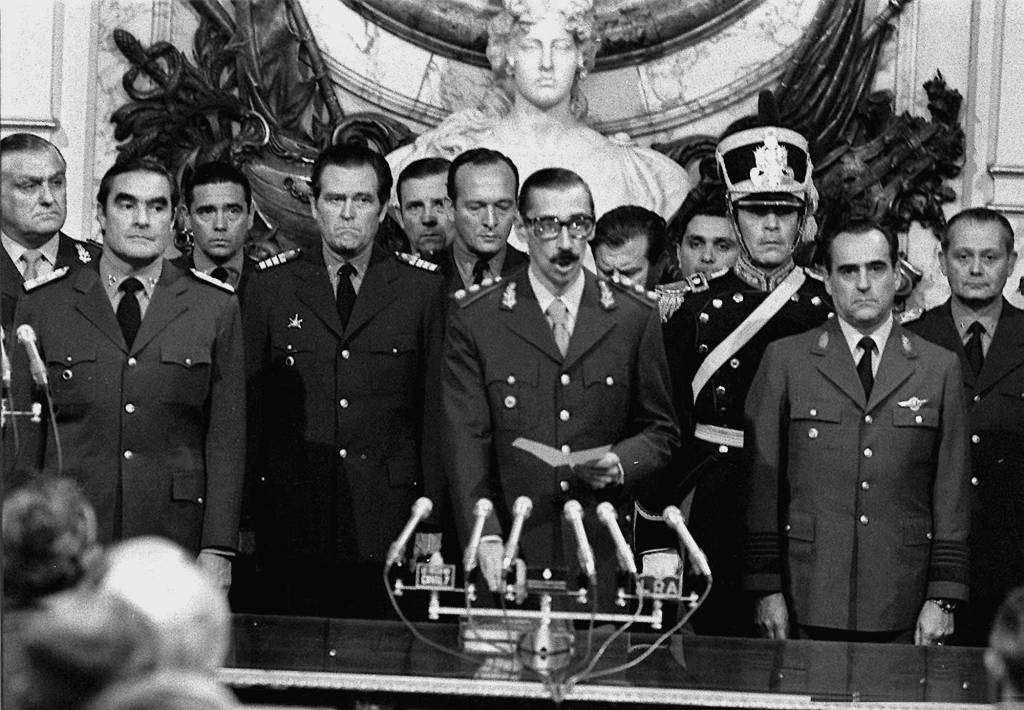
Ambassador Hill’s optimism toward the military junta quickly shifted. His cables to Washington increasingly expressed concern for the human rights situation in Argentina. Noting an increase in reports of illegal detentions and abuse, Hill recommended “a demarche at the highest level.”[3] On May 28, just two months after the coup, Hill called an urgent meeting with Argentine Foreign Minister César Guzzetti and conveyed the United States’ desire for an increased respect towards human rights and the rule of law. Reporting back to the Secretary of State, Henry Kissinger, Hill concluded that Guzzetti did not understand the problem, and Hill vowed to “keep working on him and others in [the Government of Argentina].”[4] Hill’s communications going forward stressed the gravity of the human rights situation and requested guidance from Secretary of State Kissinger. The question now was how Kissinger would react to the junta’s brutality.
Two weeks after his meeting with Ambassador Hill, Foreign Minister Guzzetti met with Secretary Kissinger in Santiago de Chile. Guzzetti broached the topic of terrorism in the Southern Cone. He claimed that thousands of refugees—fleeing dictatorships in neighboring countries—had migrated to Argentina and now provided clandestine support to domestic subversive organizations. For human rights reasons, Guzzetti complained, Argentina could not deport these refugees to their countries of origin despite his belief that they contributed to terrorist operations. He pleaded for understanding and support from the U. S. government while Argentina fought to eliminate subversion.[5] In response, Kissinger contradicted Ambassador Hill’s calls for greater respect for human rights and gave the Argentine government the green light to continue using any means necessary to combat terrorism. “If there are things that have to be done, you should do them quickly,” the Secretary of State advised. “But you must get back quickly to normal procedures.”[6] The most intense period of repression in Argentina followed, with nearly half of all disappearances occurring in 1976.[7]
From the moment President Carter assumed office the following year, the situation in Argentina served as a critical test of his foreign policy initiatives. State-sponsored repression had reached its height by Carter’s inauguration, and his administration considered Argentina the most flagrant human rights violator in Latin America. Emboldened by Kissinger’s tacit support, the military junta had initiated its most intense period of repression between June 1976 and January 1977.[8] President Carter signaled the shift in U.S foreign policy priorities by cutting in half the Ford administration’s allotted military aid to Argentina for the upcoming fiscal year. He justified this reduction in aid by citing Argentina’s human rights record. Angered by Carter’s actions, leaders of the military junta countered that “no state, whatever its ideology or power, can set itself up as a court of international justice, interfering in the domestic life of other countries.”[9] On those grounds, they rejected the remaining funds offered by Washington. U. S. and Argentine relations entered a period of heightened tension.
During Carter’s first year in office, his administration dedicated considerable attention and resources to the human rights situation in Argentina. Patricia Derian, Assistant Secretary of State for Human Rights and Humanitarian Affairs, visited Argentina on three fact-finding missions in 1977. Her visits cemented her opposition to the military junta, which she reported was “deliberately and systematically violating human rights.”[10] Among the Carter administration officials, Derian became one of the staunchest advocates for economic sanctions against Argentina. She further recommended that the U. S. maintain “a constant flow of visits between the two countries particularly of administration officials who [would] incorporate human rights concerns into all phases of relations.”[11] Derian hoped consistent pressure would send a clear message to the military junta that the U. S. government would not tolerate human rights violations.
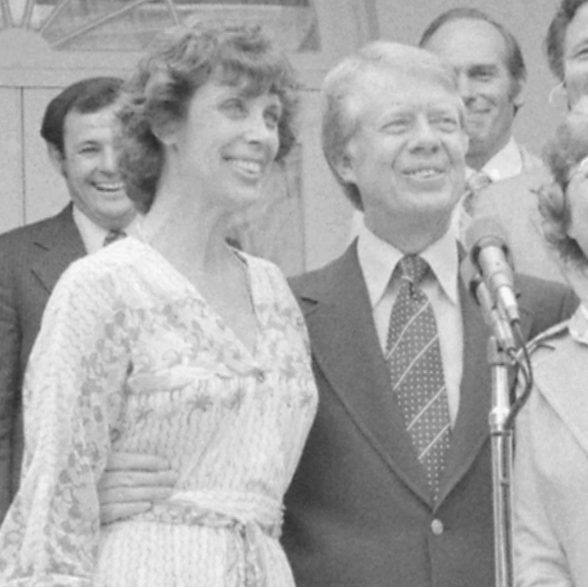
Foreign Service Officers at the U. S. Embassy in Buenos Aires also played a crucial role in supporting Derian’s work to denounce the junta’s violence. Tex Harris—performing a new role within the Foreign Service as a Human Rights Officer—opened the embassy to victims and their families in order to receive their testimonies. He documented reported cases of disappearance, detention, and torture on index cards; he also created a database of 9,000 missing persons. From 1977 to 1979, Harris filed 13,500 official complaints on human rights violations. Harris’ Foreign Service evaluation acknowledged that his reports “had direct and continuous bearing on the policy the United States adopt[ed].”[12] Through his detailed documentation, Harris created the first comprehensive account of the junta’s widespread human rights violations. This database enabled Derian to justify her calls for sanctions against the Argentine government.
Derian’s human rights advocacy posed a significant threat to the military junta’s public image. Her public denunciations gave credence to local human rights organizations’ claims of state-sponsored terrorism and contributed to the military government’s declining international reputation. Because the economic proposals depended heavily on foreign investment, military leaders worried that Derian’s public condemnations would discourage investment.[13] The junta worked to combat negative publicity and hired Burston Marstellar, a public relations firm in New York. Working with Burston Marstellar, the Argentine government ran advertisements in prominent U. S. business journals and magazines in an effort to encourage foreign investment and promote foreign trade.[14]
The military junta combined their international publicity campaign with a domestic one. They accused the Carter administration of engaging in an “Anti-Argentine” campaign. Para Ti, a women’s magazine, encouraged readers to “defend your Argentina” and “show the world the truth” by mailing patriotic postcards to those responsible for the Anti-Argentine campaign.[15] The President and Mrs. Carter figured among the list of suggested recipients.
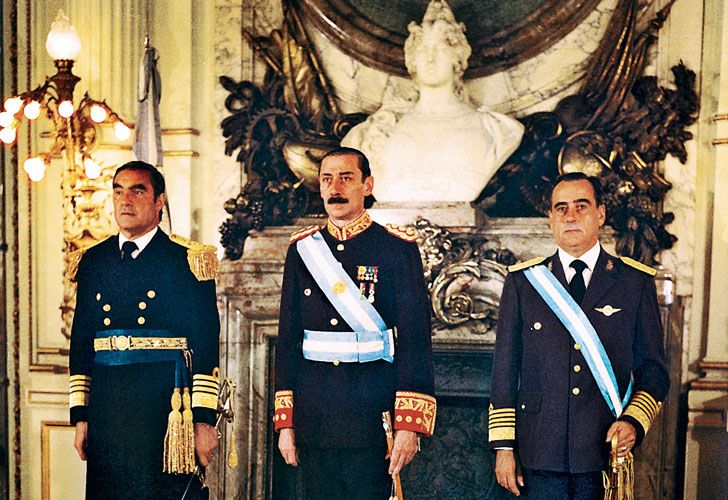
The military junta’s publicity campaign signaled its growing discomfort. However, the Carter administration had yet to see any real improvement in human rights conditions in Argentina through its diplomatic efforts. In July 1978, an opportunity to apply greater economic pressure arose. A U. S. firm, Allis Chambers, had placed a bid to supply turbines for a hydroelectric plant under construction at the Yacyreta Dam on the Paraná River in Argentina. Allis Chambers requested a $270 million loan from the U. S. Export-Import (EXIM) Bank for the project.[16]
Initially, Derian lobbied for the U. S. to withhold the loan based on Argentina’s human rights record, but U. S. business interests placed heavy pressure on Congress to override these recommendations. At the height of tensions between Washington and Buenos Aires over the pending EXIM loan decision, U. S. Vice President Walter Mondale and Argentine President Videla met in Rome. Mondale assured Videla the U. S. government would approve the loan on the condition that Argentina received the Inter-American Human Rights Commission (IAHRC) “on terms acceptable to the commission.”[17] The military junta had consistently rejected the intervention of the commission in Argentina but conceded to the deal in order to secure foreign investment.
By granting or withholding economic aid based on compliance with human rights initiatives, the Carter administration won its most important victory in Argentina. As an autonomous agency within the Organization of American States (OAS), the IAHRC had the jurisdiction to investigate human rights violations and present information to the Inter-American Court of Human Rights. Carter had strengthened the commission by providing more funding during his presidency. The funds enabled the IAHRC to hire five lawyers, buy computers, establish a library, and create a documentation center. Most importantly, the commission now had funding for onsite investigations.[18] Thus, the Carter administration both facilitated the military junta’s agreement to the visit but also the investigation itself.
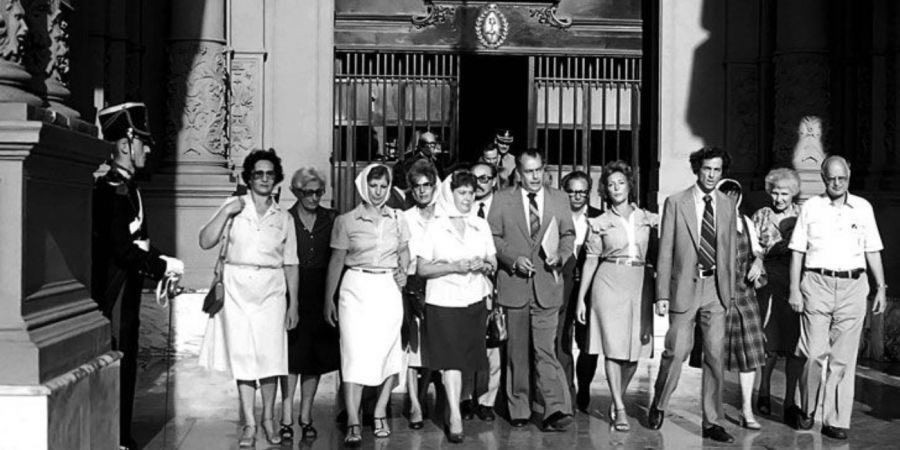
The September 1979 visit of the Inter-American Human Rights Commission marked a watershed moment for Carter’s foreign policy efforts. Following its fact-finding mission, the commission released a damning country report in 1980. The report attributed accounts of torture and death to the military and recommended that the Argentine government “initiate the corresponding investigations, to bring to trial and to punish, with the full force of the law, those responsible.”[19] The IAHRC became the first source to call for human rights prosecutions in Argentina.[20] Its report, which verified the testimony of torture victims and relatives of the disappeared, raised public consciousness about the magnitude of repression. “There can hardly be an Argentine alive who is now unaware that human rights are an issue of significance,” remarked U. S. Ambassador Raul Castro.[21] Those who had suffered personally noted, “For the first time the nation ‘sees’ our reality.”[22] The commission’s presence in Argentina also contributed to a dramatic decrease in forced disappearances. Disappearances dropped from an estimated fifty per month in 1978 to forty-four total in 1979.[23] Carter’s human rights diplomacy thus had a tangible impact on local conditions by amplifying and legitimizing the testimony of the regime’s victims.
During President Carter’s administration, he sought to advance human rights in Argentina as part of a larger effort to reimagine U. S. foreign policy in the region. Carter believed that the nation’s foreign policy should reflect its highest moral values. This meant he refused to ignore human rights abuses even when committed by U. S. allies—a definite break with the Nixon and Ford Administrations. His unwillingness to overlook such issues elicited nationalist backlash from the Argentine armed forces. However, the Carter administration’s consistent pressure succeeded in weaking the military junta’s position through public denunciations and economic sanctions. Although President Carter faced limits in his abilities to influence foreign governments, his initiatives amplified the efforts of governmental and non-governmental actors and demonstrated the feasibility of centering human rights in international diplomacy.
Gabrielle Esparza is a Ph.D. candidate in Latin American history, with a focus on twentieth-century Argentina. Her current research interests include democratization, transitional justice, and human rights. She holds a B. A. in History and Spanish from Illinois College and received a Fulbright English Teaching Assistantship to Argentina in 2017. There, she taught at the Universidad Nacional de La Plata. Gabrielle graduated with her M.A. in History from the University of Texas at Austin in 2020. Her master’s thesis, “The Politics of Human Rights Prosecutions: Civil Military Relations during the Alfonsín Presidency, 1983-1989,” examines the evolution of President Raúl Alfonsín’s human rights policies from his candidacy to his presidency, which followed Argentina’s most repressive dictatorship. At the University of Texas at Austin, Gabrielle has served as a graduate research assistant at the Texas State Historical Association and contributed to the organization’s Handbook of Texas. She served as co-coordinator of the Symposium on Gender, History, and Sexuality in 2020-2021. Gabrielle was also Associate Editor and Communications Director of Not Even Past from 2021-2022.
Editor’s note: This article is a special guest contribution to “Uncharted Waters.” The Clements Center has approved its publication as part of the series.
[1] Carlos Santiago Nino, Radical Evil on Trial, (New Haven, CT: Yale University Press, 1996), 54-55.
[2] Robert Hill, “Videla’s Moderate Line Prevails,” Buenos Aires, March 30, 1976, On 30th Anniversary of Argentine Coup New Declassified Details on Repression and U. S. Support for Military Dictatorship, ed. Carlos Osorio, Marcos Novaro, and John Dinges (Washington, D.C.: The National Security Archive, 2006), Digital National Security Archive accession number A0000514.
[3] Robert Hill to Sec State Henry Kissinger, “Request for Instructions,” Buenos Aires, 25 May 1976, Argentine Military Believed U. S. Gave Go-Ahead for Dirty War, ed. Carlos Osorio (Washington, D.C.: The National Security Archive, 2002), Digital National Security Archive accession number S200000044.
[4] Robert Hill to Sec State Henry Kissinger, “Demarche to Foreign Minister on Human Rights,” Buenos Aires, 28 May 1976, Argentine Military Believed U. S. Gave Go-Ahead for Dirty War, ed. Carlos Osorio (Washington, D.C.: The National Security Archive, 2002), Digital National Security Archive accession number S200000044.
[5] “Memorandum of Conversation,” Santiago Chile, June 6, 1976, Kissinger to the Argentine Generals in 1976: “If There are Things that Have to be Done, You Should Do Them Quickly,” ed. Carlos Osorio and Kathleen Costar (Washington, D.C.: The National Security Archive, 2004), Digital National Security Archive accession number S200202913.
[6] ibid.
[7] Secretaria de Derechos Humanos de Argentina, Comisión Nacional sobre la Desaparición de Personas, Nunca más: informe de la Comisión Nacional sobre la Desaparición de Personas (Buenos Aires: Eudeba, 2009), 302.
[8] Kathryn Sikkink, Mixed Signals: U. S. Human Rights Policy and Latin America (Ithaca, NY: Cornell University Press, 2004), 118.
[9] William Michael Schmidli, The Fate of Freedom Elsewhere: Human Rights and U. S. Cold War Policy toward Argentina. (Ithaca, NY: Cornell University Press, 2013), 96.
[10] Patricia Derian, “Notes from U. S. State Department Human Rights Coordinator Patricia Derian,” April 1977, The Pentagon and the CIA Sent Mixed Message to the Argentine Military, ed. Carlos Osorio (Washington, D.C.: The National Security Archive, 2003).
[11] ibid.
[12] Carlos Osorio, “A Human Rights Hero: The Legacy of Franklin Allen (Tex) Harris (1938–2020),” National Security Archives, March 10, 2020 (https://nsarchive.gwu.edu/briefing-book/2020-03-09/memoriam-tex-harris).
[13] Jo Fisher, Mothers of the Disappeared (Boston: South End Press, 1989), 72.
[14] Marguerite Feitlowitz, A Lexicon of Terror: Argentina and the Legacies of Torture (New York: Oxford University Press, 2011), 48.
[15] Revista Para Ti, August 1978, Patricia Derian Papers, David M. Rubenstein Rare Book & Manuscript Library, Duke University.
[16] Iain Guest, Behind the Disappearances: Argentina’s Dirty War Against Human Rights and the United Nations (Philadelphia: University of Pennsylvania Press, 1990), 171.
[17] Sec State Cyrus Vance to Ambassador Castro, “Meeting Between the Vice-President and President Videla,” September 7, 1978, Timerman Case Threatened Argentine Military Regime, ed. Carlos Osorio (Washington, D.C.: The National Security Archive, 2009).
[18] Kathryn Sikkink, The Justice Cascade: How Human Rights Prosecutions are Changing World Politics (New York: W. W. Norton & Company, 2001), 64.
[19] Inter-American Commission on Human Rights, Report on the Situation of Human Rights in Argentina, (Washington: Organization of American States, 1980, http://www.cidh.org/countryrep/Argentina80eng/toc.html.
[20] Sikkink, 66.
[21] ibid.
[22] Schmidli, 154.
[23] National Security Council, “Issue Paper-Argentina,” May 12, 1980, Presidential Briefs (Atlanta, GA: The Jimmy Carter Presidential Library, 2016).
The views and opinions expressed in this article or video are those of the individual author(s) or presenter(s) and do not necessarily reflect the policy or views of the editors at Not Even Past, the UT Department of History, the University of Texas at Austin, or the UT System Board of Regents. Not Even Past is an online public history magazine rather than a peer-reviewed academic journal. While we make efforts to ensure that factual information in articles was obtained from reliable sources, Not Even Past is not responsible for any errors or omissions.

